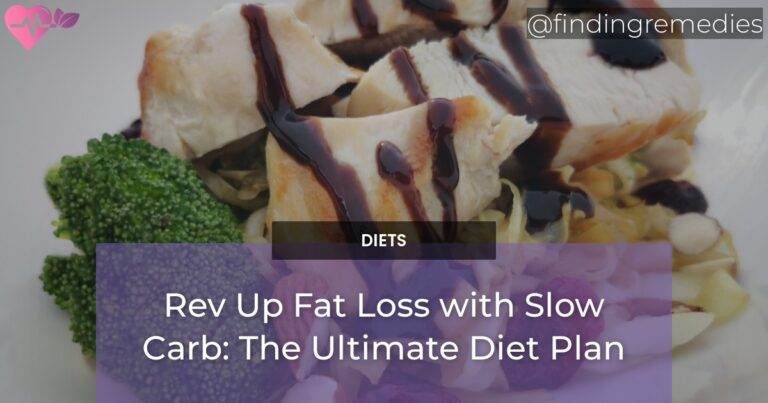Are you ready to rev up your fat loss and get the body you’ve always wanted? If you’re looking for a diet plan that can help you reach your goals without feeling deprived, the Slow Carb Diet could be the answer. This diet focuses on eating foods that will keep you feeling full and energized while helping you to burn fat.
In this article, we’ll discuss the basics of the Slow Carb Diet, how it works, and the benefits it can provide. We’ll also look at some delicious recipes that you can incorporate into your diet plan to make sure you stay on track. With the Slow Carb Diet, you can reach your goals and learn how to maintain a healthy lifestyle for the long run. So get ready to rev up your fat loss and let’s get started!
Table of Contents
Overview
What is the Slow Carb diet?
The Slow Carb diet is a low-glycemic index diet that involves consuming foods with a low glycemic index to help stabilize blood sugar levels and promote weight loss. This diet focuses on consuming slow carb foods that are rich in protein and fiber while avoiding high-glycemic index foods that cause spikes in blood sugar levels.
How does the Slow Carb diet work?
The Slow Carb diet works by regulating blood sugar levels and insulin sensitivity. By consuming slow carb foods, the body produces less insulin, which helps to prevent excess fat storage. Additionally, slow carb foods promote a feeling of fullness, which can help to reduce overall calorie intake and promote weight loss.
What are the key components of the Slow Carb diet?
- Slow carb foods such as beans, lentils, vegetables, and fruits
- Protein-rich foods such as meat, fish, and eggs
- Healthy fats such as olive oil, nuts, and seeds
- Avoidance of high-glycemic index foods such as bread, pasta, and sugar
ALSO READ
Health benefits
What are the health benefits of the Slow Carb diet?
The Slow Carb diet has several health benefits, including:
- Improved insulin sensitivity
- Reduced risk of type 2 diabetes
- Reduced risk of heart disease
- Improved weight loss
- Reduced inflammation
How can the Slow Carb diet aid in weight loss?
The Slow Carb diet can aid in weight loss by promoting a feeling of fullness, reducing overall calorie intake, and reducing insulin levels, which can lead to less fat storage. Additionally, consuming slow carb foods can help to increase metabolism and promote fat burning.
What are the scientific evidence supporting the Slow Carb diet?
Several studies have shown that low-glycemic index diets, such as the Slow Carb diet, can improve insulin sensitivity, reduce inflammation, and promote weight loss. A 2007 study published in the Journal of the American Medical Association found that a low-glycemic index diet resulted in greater weight loss than a conventional low-fat diet.
Tips for success
How to start the Slow Carb diet?
To start the Slow Carb diet:
- Eliminate high-glycemic index foods
- Consume slow carb foods with each meal
- Eat protein-rich foods with each meal
- Include healthy fats in your diet
What foods to eat and avoid on the Slow Carb diet?
Foods to eat on the Slow Carb diet include slow carb foods such as beans, lentils, vegetables, and fruits, as well as protein-rich foods such as meat, fish, and eggs, and healthy fats such as olive oil, nuts, and seeds. Foods to avoid include high-glycemic index foods such as bread, pasta, and sugar.
What are some meal plan ideas for the Slow Carb diet?
Here are some meal plan ideas for the Slow Carb diet:
- Slow Carb Breakfast: Scrambled eggs with spinach and black beans
- Slow Carb Lunch: Grilled chicken with roasted vegetables and quinoa
- Slow Carb Dinner: Baked salmon with green beans and sweet potato
- Slow Carb Snacks: Apple slices with almond butter or carrot sticks with hummus
ALSO READ
Risks and precautions
What are the potential risks of the Slow Carb diet?
There are few potential risks of the Slow Carb diet. However, consuming too many protein-rich foods and not enough slow carb foods can lead to constipation and digestive issues. Additionally, avoiding high-glycemic index foods can lead to nutrient deficiencies if not properly balanced.
Who should avoid the Slow Carb diet?
People with certain health conditions, such as kidney disease or high cholesterol, should avoid the Slow Carb diet. Additionally, pregnant or breastfeeding women should consult with their healthcare provider before starting this diet.
How to ensure proper nutrient intake while on the Slow Carb diet?
To ensure proper nutrient intake while on the Slow Carb diet, it is important to consume a variety of slow carb foods, protein-rich foods, and healthy fats. Additionally, taking a multivitamin and mineral supplement can help to ensure adequate nutrient intake.
Conclusion
The Slow Carb diet is a low-glycemic index diet that can aid in weight loss, improve insulin sensitivity, and reduce inflammation. By consuming slow carb foods such as beans, lentils, and vegetables, along with protein-rich foods and healthy fats, the Slow Carb diet can promote overall health and well-being. However, it is important to consult with a healthcare provider before starting any new diet.
RELATED ARTICLES:

